

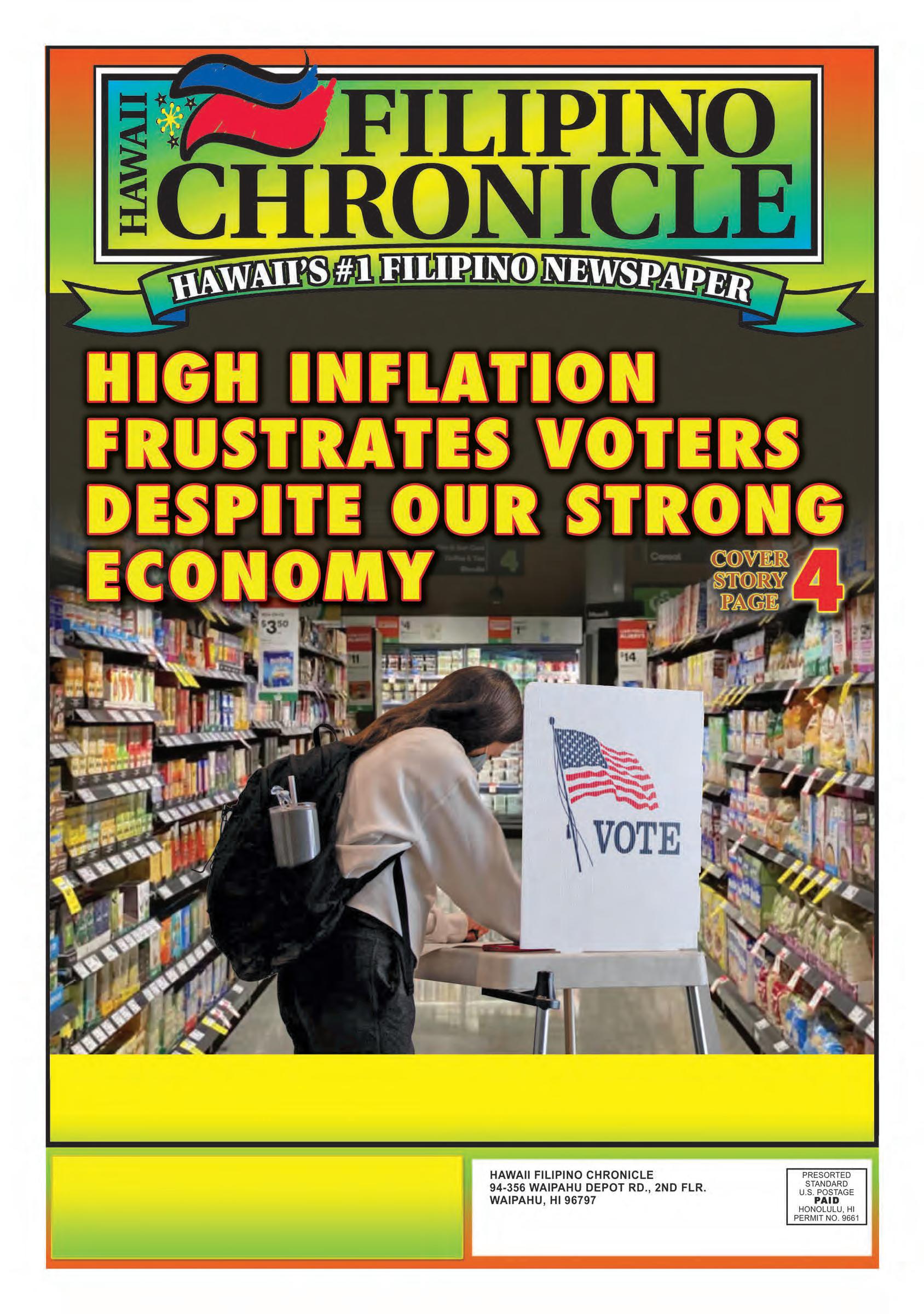
FEATURE
“cooKinG priesT” To mArK siLver JUbiLee of ordinATion in JUne


JUNE 1, 2024
SOCIAL SECURITY UPDATE
CANDID PERSPECTIVES
The LAsT 50 And The nexT 50 yeArs on The fiGhT for civiL riGhTs
sTronG economy, Low UnempLoymenT, And Job And wAGe GrowTh exTend sociAL secUriTy TrUsT fUnds To 2035

SPORTS CORNER Lee Kiefer: A fiLipinA AmericAn TrAiLbLAzer on The roAd To oLympic GLory

EDITORIAL
Politicians -- Hawaii Residents Are Hurting from High Prices and
KInflation
auai County Council Chair Mel Rapozo filed a complaint with the State Department of Commerce and Consumer Affairs on behalf of Kauai residents over the price of a loaf of bread that cost over $13. This was a significant incident because it showed how Hawaii residents and politicians can work together to affect change or at least bring about attention to the absurdity that inflation has become. What will come of this complaint is unclear at the moment, but it highlights an urgency that local residents are livid over inflation and that the State of Hawaii needs to be better consumer advocates. The state must investigate price gouging.
Decades ago, State Senator Ron Menor who then chaired the Senate Committee on Consumer Protection looked into why it was costing Hawaii so much more for gasoline. It was a rallying cry back then by locals to have our elected officials put pressure on companies suspected of price gouging. Menor was applauded, but he also received flak from interest groups over this inquiry.
It turns out that gasoline prices, like the high cost of groceries, are largely determined by both international and federal policies. For gasoline, prices are mostly determined by global supply and demand. But for both gasoline and groceries in Hawaii, importation of them is the primary reason for high prices.
And it is the Federl Jones Act – which requires that all goods carried between the U.S. ports be on U.S. built and flagged ships that also are mostly owned and crewed by Americans – that’s behind the state’s costly transportation of goods.
For decades now, there has been an increasing drive for Hawaii – as an islands chain – to be exempt from this federal law or for it to be reformed to allow for more shipping competition to include foreign companies. Advocates and some economists say this would reduce the price of goods and gasoline.
But it’s not just the overseas importation that is costing a lot that forces businesses to spike cost. Local transport of goods is also a problem. A former storefront retail owner of FINA Home Accents in Honolulu explains. It costs about the same if you order a pallet of goods to go across the U.S. from say Texas to California – over thousands of miles – than it is to get that same pallet to be picked up from the pier in Honolulu to go just a few miles to Kapiolani boulevard. And that local delivery cost will need to be added onto the overall shipment from the original point of shipping to the store.
In both cases – overseas shipping and local transport – there must be more competition. This should also be the same for all industries from grocery stores to public utilities. For example, why is it so much cheaper to transport goods across the mainland has a lot to do with an abundance of trucking companies.
Balanced approach to local business
The role local government can play is smarter management engineering, one that’s balanced, not too intrusive with overregulation that stifle business, but at the same time, not overly liberal to where businesses will operate in unfair practices like price gouging. Applied to politics – Libertarians take an extreme position that government should be hands-off everything. That’s just unbridled, chaotic capitalism. Republicans are not as extreme and more supportive of non-governmental intervention but accept some forms of regulation. But both Libertarians and Republicans locally have very little influence in local governance. Democrats tend to favor too heavily on organized interest groups that in some cases do in fact thwart competition and thus help to keep goods priced high. At the same time at the national level, Democrats (along with Republicans) have become too cozy with big corporations whose record-breaking profits are causing tremendous harm on working families.
Inflation and the Federal Reserve
Specifically, regarding inflation (pace of rising costs relative to value of dollar) again, we are dealing with federal policies when
FROM THE PUBLISHER
Our series of top election issues we’ve covered to date this year have included cover stories on housing, immigration, abortion, Medicare, Social Security, foreign policy-aid and war.
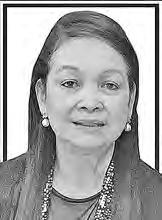
For this cover story, HFC associate editor and veteran political analyst Edwin Quinabo reports on arguably the most important issue to most Americans according to polls – inflation and the economy. There are myriad of weighty and pressing issues that politicians must be aware of, but inflation is one that politicians should have their eyes locked on because a great number of Americans find it deeply troubling, especially in Hawaii. While the economy is strong on paper (bolstered by a segment of society), it is not a true reflection of typical Americans who speak of altering lifestyles just to survive, our cover story finds. Several in our community describe the extent of their hardship, their frustrations. It being a crucial election year, we also get a glimpse at some in our community’s voting inclinations based off the economy and inflation.
An update on one of this year’s important issues earlier covered by the Hawaii Filipino Chronicle, we have an article by Jane Burigsay-Yamamoto who reports the good news that Social Security is projected to have enough dedicated revenue to pay all scheduled benefits and administrative costs until 2035, according to a recent Social Security Board of Trustees report.
This issue is jam-packed with highly informative and interesting articles. HFC contributor Edna Baustista, Ed.D. revisits Fr. Leo Patalinghug who she interviewed years ago. Fr. Patalinghug is such a popular and fascinating figure in our community that we wanted to feature him again to get an update. Next month, he will be celebrating his silver jubilee (25 years) ordination to the Roman Catholic Church. Read about this famous “cooking” priest’s latest projects. Congratulations Fr. Patalinghug.
The Olympics is this summer and we have perhaps the largest contingent ever of Filipinos from the U.S. and the Philippines who have already qualified for the Games. Our HFC contributor and sportswriter Dr. Dylan Bothamley features “Lee Kiefer: A Filipina American Trailblazer on the Road to Olympic Glory.” Keifer became the first American to take an Olympic gold medal in individual foil fencing and will look to defend her Olympic title at the Paris 2024 Olympics.
Our HFC columnists take on fascinating topics: Atty. Emmanuel Tipon contributes “Trump Criminal Case: You Be the Judge,” Emil Guillermo writes “The Last 50 and the Next 50 Years on the Fight for Civil Rights,” Elpidio Estioko updates us on Ysabel Jurado in his “Quest for 1st FilAm Elected Member of LA City Council Gains Momentum,” Will Espero covers “All About Cannabis,” Rose Cruz Churma reviews “The Manila We Knew And Street-Bound: Manila On Foot,” Seneca Moraleda-Puguan reflects on “Always Developing, Never Developed,” and Bernie Dizon inspires us with “Reflection of a Dad on Father’s Day.”
Lastly, HFC columnist Arcelita Imasa gives us a roundup of some important legislation in this year’s Hawaii State Legislature. Find out what passed and what didn’t on the following topics: End the Subminimum Wage, Housing: Short-term rentals, Paid Sick Leave and Family/ Medical Leave, Ceasefire in Gaza Resolution, Rental Repairs, and others.
Thank you for supporting the Hawaii Filipino Chronicle. Visit our website for your e-copy of the Chronicle. Until the next issue, Aloha and Mabuhay!

it comes to inflation with the Federal Reserve largely influencing it. The Feds will determine the federal fund rate, which influences bank’s interest rates, which affects loans and credit – which is the lifeline to businesses.
In yet this other example, we see again that local Hawaii politicians have little to no control as the Federal Reserve is independent from the U.S. government. But the federal government can influence the direction of the Federal Reserve in the appointment of its chairman of the Board of Governors of the Federal Reserve System, who is nominated by the president of the U.S. and confirmed by the U.S.
(continue on page 3)
Publisher & Executive Editor
Charlie Y. Sonido, M.D.
Publisher & Managing Editor
Chona A. Montesines-Sonido
Associate Editors
Edwin QuinaboDennis Galolo
Contributing
Editor
Belinda Aquino, Ph.D.
Design
Junggoi Peralta
Photography
Tim Llena
Administrative Assistant
Lilia Capalad
Editorial & Production Assistant
Jim Bea Sampaga
Columnists
Carlota Hufana Ader
Rose Cruz Churma
Elpidio R. Estioko
Willie Espero
Perry Diaz
Emil Guillermo
Gary Hooser
Arcelita Imasa, M.D.
Seneca Moraleda-Puguan
J.P. Orias
Charlie Sonido, M.D.
Emmanuel S. Tipon, Esq.
Contributing Writers
Clement Bautista
Edna Bautista, Ed.D.
Teresita Bernales, Ed.D.
Sheryll Bonilla, Esq.
Dr. Dylan Bothamley
Serafin Colmenares Jr., Ph.D.
Linda Dela Cruz
Carolyn Weygan-Hildebrand
Amelia Jacang, M.D.
Caroline Julian
Max Levin
Raymond Ll. Liongson, Ph.D.
Federico Magdalena, Ph.D.
Matthew Mettias
Maita Millalos
Paul Melvin Palalay, M.D.
Renelaine Bontol-Pfister
Seneca Moraleda-Puguan
Mark Lester Ranchez
Jay Valdez, Psy.D.
Glenn Wakai
Amado Yoro
Philippine Correspondent:
Greg Garcia
Neighbor Island Correspondents:
Big Island (Hilo and Kona)
Grace LarsonDitas Udani
Kauai
Millicent Wellington
Maui
Christine Sabado
Big Island Distributors
Grace LarsonDitas Udani
Kauai Distributors
Amylou Aguinaldo
Nestor Aguinaldo
Maui Distributors
Cecille PirosRey Piros
Molokai Distributor
Maria Watanabe
Oahu Distributors
Yoshimasa Kaneko
Shalimar / Jonathan Pagulayan
Advertising / Marketing Director
Chona A. Montesines-Sonido
Account Executives
Carlota Hufana Ader
JP Orias

2 HAWAII FILIPINO CHRONICLE JUNE 1, 2024
Marcos Jr.’s New Foreign Policy Approach for the Philippines of Favoring the U.S. Over China is an Unnecessary
The Philippines has endless potential.
During President Rodrigo Duterte’s term, the titan investment bank Goldman Sachs, predicted the Philippines could be a top 15 world economy in several decades. It has a burgeoning world-class tourism market. It has yet to utilize their rich natural resources that have propelled other Asian nations into super economic status like China and Indonesia.
The last thing the Philippines would want is to get into a military conflict over contested islands in the Indo-Pacific that could unravel all that potential and shoot down all the gains the Philippines has been making since former President Benigno Aquino III and through the Duterte administration.
Bongbong treading dangerous waters
In a recent interview with the Global Times, Rodrigo had some eye-opening revelations on the dangerous path Ferdinand “Bongbong” Marcos Jr. is taking regarding the Philippines’ foreign policy. When Duterte was president, he had a neutral foreign policy for the Philippines, one in which he dealt with both China and the U.S. without any favor of one over the other. It can be argued, this is one reason why the Philippines experienced major economic growth even as Duterte was accused of gross hu-
Senate. But in real practice, there is little difference in political philosophy towards the status quo among both Democrats and Republicans and their selection of chairman.
Locals are hurting
There are no easy solutions or one silver bullet to alleviate high prices and inflation in Hawaii, or for that matter, in the rest of the country.
What’s clear is that an increasingly number of Americans are feeling the pangs of high prices and inflation with some groups hurting more than others. But it’s gotten to a point that even upper middle-class Americans are feeling a pinch.
manitarian violations. Duterte’s neutral stance encouraged both Chinese and U.S. investments to stream into the Philippines.
Since Marcos Jr. became president, the Philippines’ foreign policy has shifted dramatically to one in which Marcos is following in the footsteps of his father, former president Ferdinand, Sr., who maintained cozy relations with the U.S. His father Ferdinand Sr. back then leased two major bases to the Americans. The lease to those bases was terminated years ago. But today, the U.S. once again has many bases there (soft bases, not as huge as the former Subic and Clark bases), according to Duterte.
What’s striking about this interview is Duterte’s remarks that the U.S. is being aggressive and hostile in the region and that they are pressuring the Marcos, Jr administration to do what they want. He accused the U.S. of aggravating the dispute over the contested Spratley and other territories between the Philippines and China.
Duterte said, back when he was president, he, and China’s leader Xi Jinping, had an agreement to leave that issue alone and not force hostility or even a resolution. At the time, those waters around the contested islands were enjoyed by both Philippines and Chinese fishermen, he explained. This is a superficial, trivialized accounting, but his main point of conflict avoidance is well taken.
However, today, he said, the
How we got here is cumulative neglect by mostly the federal government relying on the same systematic tools over decades, no matter if the ruling party of the time is a Republican or Democrat. Ultimately, the modus operandi has been to side with big corporations, the powerful and organized that do not necessarily have the best interest of most Americans in mind. But rather, their own bottom line.
Many Hawaii locals are upset, anxious and frustrated over their financial hardship. Some are pointing their fingers at local politicians who actually do not have immense influence as politicians at the federal level (but local politicians can make marginal impact). It becomes more frustrating for not just
and Dangerous
Americans are fueling hostility over these contested islands as a pretext to wanting the Philippines to engage in conflict with China.
Duterte went as far as saying that the U.S. is encouraging conflict, affirming to the Philippines not to be afraid and that the U.S. would back them in any conflict. Under Marcos Jr., the U.S. and the Philippines have conducted joint military exercises. The U.S. in their latest Foreign Aid package also included billions for the Indo-Pacific region, mostly to Taiwan. Earlier this year, Marcos Jr. and Japan’s prime minister of Japan Fumio Kishida met with President Joe Biden in the White House for a trilateral meeting to advance trilateral defense cooperation.
All of this is not going unnoticed to China and these developments are sending a message to China that the Philippines is no longer neutral but picking to be on the side of the U.S. under the guise of needing protection (which it does not need) in the case of conflict over disputed territories.
Philippines is reverting backwards to being a little brown brother of the U.S.
What’s unfolding is clear, classic American foreign policy, of using smaller nations as pawns to get at larger adversaries, in this case China, or as the U.S. did with Ukraine in Europe prior to Russia’s invasion. Included in this strategy is as Duterte alludes to – pressured conditions either diplomatically or quite possibly
Hawaii residents but Americans everywhere when their federal representatives of both political parties have the same agenda of promoting the status quo. This is why we are here, with many of us rocking on the same boat, looking at the price of a loaf of bread that could be in some cases over $13, and in complete shock and anger over it.
We need more competition, more substitutes, and support for a greater number of small businesses to enter all industries. The Federal Jones Act must be reformed. We need stronger consumer protection to investigate price gouging. Citizens should also be active and report price gouging. All of these could help to at least stabilize runaway prices.
Path
but unreported to date, economic pressure as well.
The last thing the Philippines needs is for the Marcos Jr. administration to convince Filipinos that they in fact need the U.S. for protection, and as such, identifies China as an enemy. And worse yet, to engage in some unnecessary proxy war over disputed territory.
The Philippines has already left that pawn-status behind decades ago when they decided not to renew the leases of Subic and Clark bases, and for good reason.
Duterte’s non-aggressive approach to the disputed territories with China was the right strategy. It’s almost comical to entertain a dispute (or prepare for one) against a superpower as China with so-called backing from the U.S. Look at Ukraine. How is that turning out for Ukraine? Furthermore, the Philippines is not threatened by China at all. It’s not Taiwan. The need for U.S. protection from China over disputed territories is fabrication of a bogeyman (China). Why is the bogeyman scare fake? Because just a few years ago under Duterte, China and the Philippines enjoyed mutually cordial relations.
Why Marcos Jr. is returning to the U.S. with such high favor and partiality over China and inviting U.S. military presence is mind boggling. In his father’s case, it had to do with corruption. What is Ferdinand Jr being offered as a carrot to make this shift?
Lucrative foreign investments? Or is the U.S. simply exerting hegemonic pressure onto Marcos Jr. that he cannot brush off (after all, Marcos, Jr. is no Duterte). The reason remains unclear.
What is clear is that the Marcos Jr. administration should not be allowed to be played as a pawn in geopolitics by the U.S. to get at China. If in fact massive military or American foreign investments are being attached to this new “we’re now on the U.S. side” of foreign policy, Marcos Jr. should know better that there are consequences to “pay and play.” It’s not simple to cash out and tell the Americans to go away as they were able to do years ago. U.S. military “protection” comes at a cost like losing some degree of the Philippines’ independence, and worse yet, potentially lead to conflict with China.
The U.S. since W. Bush has been calling for a greater shift in presence from Europe and the Middle East to the Asia-Pacific, realizing the importance of that region as the global future. It could be, considering the U.S.-Philippines historical relationship, that the U.S. now sees it fitting under Marcos Jr (just like the good old days with his father) to reestablish those ties and U.S. military outposts. But the Philippines, given their marginal success being neutral to both superpowers (U.S. and China) of late, it’s in the best interest of the Filipino people that Marcos Jr. continues that inherited legacy of neutrality.

JUNE 1, 2024 HAWAII FILIPINO CHRONICLE 3
EDITORIAL
(Politicians ....from page 2)
Third Consecutive Year of High Inflation Frustrates Filipinos That Could Influence Election Outcome
By Edwin Quinabo
Broad economic data shows that while the U.S. economy is resilient and rolling, Americans’ optimism over the economy is dampened by stubbornly high inflation.
The persistent tug of inflation on household budgets is not only among the biggest issues for the U.S. electorate going into the general election, but it could depress President Joe Biden’s reelection chances, according to a Financial Times poll. Voters are growing less supportive of Biden, with 58% disapproving of his handling of the economy and inflation.
The poll results suggest voters blame Biden for higher prices for gasoline and food, without giving him credit for a strong economy, the Financial Times reports.
Economists say having a strong economy – which Biden can get credit for – does not necessarily mean contentment over the economy. Economists use mainly the gross domestic product (GDP) or total output of goods and services to measure economic strength. But GDP has biases and doesn’t tell the complete story. It could be that wealthy sectors of society are boosting GDP while large sectors of Americans are struggling, which could be one explanation why many Americans report difficult financial times despite reports of a fairly robust economy, experts say.
Inflation -- when the value of the dollar falls, and the price of goods rises – is only one snapshot of the economy. With prices, they will always keep growing but inflation usually determines the pace of price increases. The lower the inflation, the slower that pace is, usually. But most Americans as consumers only see the prices of goods and services going up and their budgets shrinking in part because their income is not keeping pace with inflation.
An ABC News/Ipsos poll this month found that price increases remain a top concern for voters and U.S. adults trust Donald Trump over Biden on inflation by a double-digit margin. Eighty five percent of poll participants said inflation is an important issue, the second-highest priority among adults surveyed after the economy. Respondents said they trusted Trump over Biden by a margin of 14 percentage points.
What young people think about inflation and the economy
A Democratic-aligned public opinion research group Blueprint shows 52% of young voters trust Trump more than Biden when it comes to lowering prices. Just 13% of voters think Biden is most focused on lowering prices while 32% of voters said Trump would be better focused on lowering prices.
Blueprint said, “The two biggest issues of this election, inflation and immigration, it’s very notable that with young voters — those are the only places Trump has an advantage, and it’s particularly concerning.” Other issues could sway their decision-making and historically young people are generally more inclined to choose a Democrat candidate over a Republican candidate on a wide array of issues.
But the polling also found that nearly every young voter answered that both inflation and the economy were the most frequently prioritized issues, chosen by 73% and 70% of young voters. Another Democratic polling firm HIT Strategies mirrored the Blueprint survey.
Politicos point that this could be problematic for Biden because he overwhelmingly won among young voters in the last election and will likely need this demographic to be successful this election as well. In 2020, Biden won 61% of voters under 30 and 55% between 30 and 44, according to an AP VoteCast survey.
“Inflation is something that affects absolutely everybody,” Elaine Kamarck, a senior fellow in the Governance Studies program at the Brookings Institution. “People notice it, whether they’re rich or poor.”
Filipinos on inflation and who to hold accountable
Fidel Hufana, retired healthcare worker, Waipahu, said “The current [Biden] administration is to blame, don’t kid yourself! The news will spin it. But the reality is that if you look at your quality of life and the quality of life in America as a whole, we were better off four years ago. We didn’t have all these issues with inflation. The housing market was stable. Consumers were able to do more and pay less. The current state of affairs will definitely influence

my vote!”
He adds, “We need to get a new administration. The federal funding as a whole, nationwide has to go to our own people, not other countries. We have so many people who could benefit from healthcare, housing, and so on, we really should focus our efforts on the needs of Americans!”
Mark Asuncion, Pearl City, also blames Biden, “Not enough effort is being placed on improving inflation. All we’re hearing from Biden is efforts to help foreign countries, handing out billions in foreign aid. But what about Americans’ needs. Congress is also to blame for this. There must be accountability for both political parties. But Biden is our leader, and he’s failing, and Americans are upset because we’re hurting financially. Trump will get my vote because it’s costing too much to make ends meet and Biden hasn’t done enough.”
Cora Salvador, Moanalua, said it’s easy to blame Biden. But high prices are more directly related to corporations’ greed and price gouging. “At least Biden is trying to get to the heart of the problem, which is runaway prices set by corporations. And he can’t do much since we have a divided Congress controlled by both political parties. Trump would be worse to handle inflation because he would let corporations do whatever they want. If Trump was in office this past four years, I believe it would have been the same with inflation because it’s mostly a result of the aftermath of the pandemic that we’re still recovering from. I’m sticking with Biden.”
In March this year, Biden announced a “strike force” was formed to hold companies accountable for price gouging. He (continue on page 5)
4 HAWAII FILIPINO CHRONICLE JUNE 1, 2024 COVER STORY
COVER STORY
(Third Consecutive.....from page 4)
recently called out corporation greed as a contributing factor in high prices.
“If you take a look at what people have, they have the money to spend. It angers them and angers me that you have to spend more,” Biden said. “It’s like 20 percent less for the same price. That’s corporate greed. And we have got to deal with it. And that’s what I’m working on.”
Trump criticized Biden’s remark saying that Biden is assuming Americans have that extra money to spend when many Americans don’t.
Biden’s campaign repeatedly boasts that Biden has delivered where Trump failed – a strong economy with 15 million new jobs and record-low unemployment, bringing down costs, and investing billions in communities that have been left behind for far too long.
Many economists agree with at least parts of Biden’s assessment and affirm high inflation usually is a result of a fast-growing economy and strong employment, which is why the Feds are working to tame inflation cautiously because it could be disruptive to the economy and employment. It’s like a balancing act, some economists say.
The heavy blows of inflation Economists say 2023 was the third year of high inflation since the pandemic, with 2022 registering a record high of 9.1%, the highest annual rate in more than 40 years. The current annual inflation for the 12 months ending April 2024 is 3.36%, which shows a considerable drop. But the Federal Reserve believes it is still too high and targets a 2% annual inflation rate as a sign of a healthy economy.
Prices have surged 20.8% since February 2020, when the outbreak-induced recession began, according to the National Bureau of Economic Research. Frustration is over high prices that just never came down in many instances, experts say. But the pace of increase has in fact slowed down.
Recently Kauai County Council Chair Mel Rapozo and Kauai residents have complained about inflation. Items in Hawaii are known to be higher than usual relative to the mainland and for some items on the neighboring islands, they are higher than Oahu due to the cost of extra shipping. Rapozo’s grievance over inflation came about due to the price of a loaf of bread that cost over $13.
“I have children who don’t live here because they can’t afford it,” Rapozo said. “Here on Kauai, we are used to things being a few dollars more, but this seemed too much.” He thought originally the price of bread was a joke. Rapozo said he filed a complaint with the State Department of Com-
merce and Consumer Affairs.
The University of Hawaii Economic Research Organization (UHERO) reports Honolulu’s inflation rate this past March rose 4.8% over the previous year, which is 34% higher than the national rate.
According to a recent FT-Michigan Ross poll, high prices are one of the biggest financial challenges for 80% of voters. Nearly two-thirds (65%) of U.S. adults were “worse off” because of inflation, and 19% said their financial situation was “much worse.” Roughly 1 in 6 (16%) couldn’t pay all their monthly bills, a new Federal Reserve data shows, taken from the Fed’s 11th annual Survey of Household Economics and Decisionmaking.
In the same survey, half of adults didn’t have money left over after paying their monthly expenses. There were also higher instances of not having enough money to eat, not covering bills in full and skipping medical care.
Parents living with children under the age of 18 are the demographic hardest hit. Childcare has gone up and amounting to some 50% of what parents shelled out for their monthly housing payment, according to the survey. Rising gasoline and housing costs accounted for 70% of the price increases last month, according to data from the U.S. Bureau of Labor Statistics.
Consumer spending has decelerated on big (homes, cars) and small (retail) purchases because of high prices that economists say could be-
gin to hurt the overall economy.
“For the last couple of years, the economy has been driven by household spending and now people are starting to say, ‘Let’s retrench here,’” said Jeffrey Roach, chief economist for LPL Financial. “The pressure from inflation has finally started to hit even upper-income households.”
Retail sales were flat last month and giant retailers like Home Depot, Under Armour and Starbucks all reported disappointing earnings.
Hufana said he stopped working due to health issues before the pandemic, but his household financial situation didn’t change much because his wife is a registered nurse, and his children are grown up and working. He said, “The value of the dollar has decreased so much that being a consumer is taking a toll on daily expenses. Everything has gone up significantly. If you compare grocery items like a bag of chips from $3.50 to $4.98, that is significant. Essentials like bread and toilet paper have increased in pricing over $2.00. When I look at my current grocery bill, I pay more for less items. Healthcare rates have increased, as well. All you have to do is compare your premiums from now to before. You cannot deny the increase. If you look at your utility bills, and compare the rates, you will see that prices have increased.
“In a household of two people, utilities are comparable to a family of four in 2019. You can look at classifieds and
“The value of the dollar has decreased so much that being a consumer is taking a toll on daily expenses. Everything has gone up significantly! If you compare grocery items like a bag of chips from $3.50 to $4.98, that is significant. Essentials like bread and toilet paper have increased in pricing over $2.00. When I look at my current grocery bill, I pay more for less items. Healthcare rates have increased, as well. All you have to do is compare your premiums from now to before. You cannot deny the increase. If you look at your utility bills, and compare the rates, you will see that prices have increased. In a household of two people, utilities are comparable to a family of four in 2019. You can look at classifieds and see that rent has also increased. Rent in some areas is higher than the standard mortgage, which is ridiculous. Looking at the housing market, the prices of houses have doubled and tripled. Getting a loan for a house is ridiculous and the HOA is also an issue, some places charge HOA fees that are over $2,000. That is price gouging, and many complexes don’t even do any improvements to validate increasing costs.” – Fidel Hufana, retired healthcare worker, Waipahu, HI
see that rent has also increased. Rent in some areas is higher than the standard mortgage, which is ridiculous. Looking at the housing market, the prices of houses have doubled. Getting a loan for a house is ridiculous and the HOA is also an issue, some places charge HOA fees that are over $2,000. That is price gouging, and many complexes don’t even do any improvements to validate increasing costs,” Hufana said.
He said while he doesn’t have difficulties paying his monthly bills, he knows others he used to work with who do, citing paying for utilities as difficult for them.
Asuncion said his wife balances their checking account and pays their bills. “She complains about how our internet connection keeps rising. It started from $65 a month, but it’s now well over $100 a month. The cost of our cars and home insurance, bundle rate, have also gone up. They say home insurance is higher because of the Maui wildfires. But that isn’t fair that we must pay more. It’s not like we’ve
made any claims on either one of our insurances. We need politicians who can fight for us. We need better consumer protection. Our lawmakers should investigate whether the increased cost is warranted and not just price gouging. If insurance companies need to raise our coverage fees to build an emergency fund, maybe they should be paying their CEOs less money, skim their profits, and use some of that to go toward an emergency fund and not have customers pay more.” Salvador does the shopping for her family of five – besides herself, her husband and her adult daughter along with her daughter’s husband and four-year old son. My daughter and her family recently moved back home about two years ago because of the high cost of childcare and rent. My daughter contributes $375 a month for groceries. But we spend about $150-200 a little over a week for groceries for a family our size. I’ve noticed for the same quantity of groceries, it costs us about 20% more. Fortunately, I retired (continue on page 6)
JUNE 1, 2024 HAWAII FILIPINO CHRONICLE 5
SOCIAL SECURITY UPDATE
Strong Economy, Low Unemployment, and Higher Job and Wage Growth Extend Social Security Trust Funds to 2035
By Jane Burigsay-Yamamoto
he Social Security Board of Trustees recently released its annual report on the financial status of the health of the Social Security Trust Funds.
TThe combined asset reserves of the Old-Age and Survivors Insurance and Disability Insurance (OASI and DI) Trust Funds are projected to have enough dedicated revenue to pay all scheduled benefits and associated administrative costs until 2035, one year later than projected last year, with 83% of benefits payable at that time.
In the 2024 Annual Report to Congress, the Trustees announced:
• The asset reserves of the combined OASI and DI Trust Funds declined by $41 billion in 2023 to a total of $2.788 trillion.
• The total annual cost of the program is projected to exceed total annual income in 2024 and remain higher throughout the 75year projection period. Total cost began to be
from working for the state, so I am able to watch my grandson while his parents work, which saves them from spending for childcare.
Strategies to beat inflation
higher than total income in 2021. Social Security’s cost has exceeded its non-interest income since 2010.
• The year when the combined trust fund reserves are projected to become depleted, if Congress does not act before then, is 2035. At that time, there would be sufficient income coming in to pay 83% of scheduled benefits.
Martin O’Malley, Commissioner of Social Security, said:
“This year’s report is a measure of good news for the millions of Americans who depend on Social Security, including the roughly 50% of seniors for whom Social Security is the difference between poverty and living in dignity -- any potential benefit reduction event has been pushed off from 2034 to 2035. More people are contributing to Social Security, thanks to strong economic policies that have yielded impressive wage growth, historic job creation, and a steady,
tertainment options.

low unemployment rate. So long as Americans across our country continue to work, Social Security can — and will — continue to pay benefits.”
“Congress can and should take action to extend the financial health of the Trust Fund into the foreseeable future, just as it did in the past on a bipartisan basis. Eliminating the shortfall will bring peace of mind to Social Security’s 70 million-plus beneficiaries, the 180 million workers and their families who contribute to Social Security, and the entire nation,” he added.
Other highlights of the Trustees Report include:
• Total income, including interest, to the combined
OASI and DI Trust Funds amounted to $1.351 trillion in 2023. ($1.233 trillion from net payroll tax contributions, $51 billion from taxation of benefits, and $67 billion in interest)
• Total expenditures from the combined OASI and DI Trust Funds amounted to $1.392 trillion in 2023.
• Social Security paid benefits of $1.379 trillion in calendar year 2023. There were about 67 million beneficiaries at the end of the calendar year.
• The projected actuarial deficit over the 75-year long-range period is 3.50% of taxable payroll – lower than the 3.61% projected in last year’s report.
• During 2023, an estimated 183 million people had earnings covered by Social Security and paid payroll taxes.
• The cost of $7.2 billion to administer the Social Security program in 2023 was a very low 0.5% of total expenditures.
• The combined trust fund asset reserves earned interest at an effective annual rate of 2.4% in 2023.
“I will continue to urge Congress to protect and support Social Security and restore the growth of the funds. Whether Congress chooses to eliminate the shortfall by increasing revenue, reducing benefits, or some combination, is a matter of political preference, not affordability,” Commissioner O’Malley said.
“Congress currently has several bills that address the shortfall without benefit cuts -- it should debate and vote on these and any other proposals. It’s critical that Congress acts quickly to address the projected trust fund shortfalls, to gradually phase in necessary changes as the Trustees have recommended.”
The Board of Trustees usually comprises six members.
Four serve by virtue of their positions with the federal government: Janet Yellen, Secretary of the Treasury and Managing Trustee; Martin O’Malley, Commissioner of Social Security; Xavier Becerra, Secretary of Health and Human Services; and Julie Su, Acting Secretary of Labor.
The two public trustee positions are currently vacant.
View the 2024 Trustees Report at www.ssa.gov/ OACT/TR/2024/.
cable subscription. In the old days, we had lots of movies to choose from. Now there’s hardly any good quality movies. We have a whole bunch of channels with nothing worth watching because we must pay extra for premium stations like HBO and Showtime that’s not included in basic cable. Most of the good movies are now released on streaming. It is no longer cost-effective to pay for cable and streaming. It’s frustrating because every company is milking us more and more. At the same time, our wages are frozen because our employers are claiming they’re not making enough money. It makes no sense.” (
Savingandsimplicity.com recommends a few ways to lessen the strain of inflation on family budgets -- shop sales, make more home cooked meals, bring your own coffee, lunch and snacks to work, opt for drinking water instead of juices and sodas, fill up your gas at stations that sell it cheaper, de crease your trips, plan a stay cation, keep a pricing book, combine your errands and look for cheap en-
Hufana said, “I do not go out as often as I used to because it’s ridiculously expensive. Even fast-food prices are extremely high. For others who cannot really afford to pay for cable, I suggest you stream using Roku to get Netflix, Prime, Hulu or others. You can sign up for trials then cancel later. I find and use coupons more often now. You can also join rewards programs to get money back or discounts. If you go out, go during happy hour when prices of food and drinks are half off. Look for BOGO deals. You can cut costs; you just have to look for them.”
Asuncion said he’s thinking about switching his internet service. He would also like to investigate more competitive rates for his insurances. “The thing is we’re so busy with working that we put off things that can save us money like shopping for better deals, not just on services and mandatory fees like insurance, but on other expenses that have gone up. It’s very frustrating, especially for my wife because she handles our finances. She has a general rule. She says she never pays our monthly bills at night because the stress doesn’t allow her to sleep. Instead, she puts aside time to pay bills on Sunday afternoon after church and
lunch. We’re elderly and living off our pension. It’s getting harder each year to survive.”
Salvador shares her savings tips – “Use a credit card that offers cashback. If you have credit card balances, pay attention to lower interest rate offers and transfer the higher balance to a lower one. If you are a long-time customer of your mobile phone carrier, that industry is very competitive in that they often reward loyal customers with a lower and fixed price. I wish we had that competitiveness with public utilities. Our lawmakers should investigate that so we can shop for better prices. We’re also thinking about canceling our
6 HAWAII FILIPINO CHRONICLE JUNE 1, 2024
COVER STORY: Third Consecutive....from page 5)
 By Atty. Emmanuel S. Tipon
By Atty. Emmanuel S. Tipon
isclosure: I first met Donald J. Trump on July 20, 2016 in Cleveland, Ohio, at the Republican National Convention.
DI was a Trump delegate from Hawai’i. I have been admitted to practice in New York for 45 years and wrote law books and legal articles on New York law.
On April 15, 2024, me and my son Noel, a lawyer specializing in criminal defense for military service members, having served in the Marine Corps, sat in a courtroom of the New York County Supreme Court to attend the trial of former President Donald J. Trump in a criminal case, a historical event because this is the first time an ex-President has been indicted.
The New York Statute
The New York statute § 175.10 allegedly violated by Trump provides:
“A person is guilty of falsifying business records in the first degree when he commits the crime of falsifying business records in the second degree, and when his intent to defraud includes an intent to commit another crime or to aid or conceal the commission thereof.”
The charge against Trump
Indictment No. 71543-23 filed in the Supreme Court of the State of New York, County of New York, The People of the State of New York against Donald J. Trump, defendant, alleges:
“THE GRAND JURY OF THE COUNTRY OF NEW YORK, by this indictment, accuses the defendant of the crime of FALSIFYING BUSINESS RECORDS IN THE FIRST DEGREE, in violation of Penal Law § 175.10, committed as follows:
The defendant, in the County of New York and elsewhere, on or about February 14, 2017, with intent to
WHAT’S UP, ATTORNEY?
Trump Criminal Case: You Be the Judge
defraud and intent to commit another crime and aid and conceal the commission thereof, made and caused a false entry in the business records of an enterprise, to wit, an invoice from Michael Cohen dated February 14, 2017, marked as a record of the Donald J. Trump Revocable Trust, and kept and maintained by the Trump Organization.”
That is the FIRST COUNT of the indictment. There are 33 other counts, for a total of 34 counts.
The only difference in the other counts is the nature of the document involved.
The Evidence
The prosecution presented 20 witnesses. The defense presented 2.
Stephanie Clifford, aka Stormy Daniels, reputed to be an actress in “adult” (pornographic) movies testified that she had sexual relations with Trump in the “missionary” position. She also said that she entered into a deal with Michael Cohen whereby she was paid $130,000 so she will not talk about her sexual relationship with Trump. Trump has denied it.
Michael D. Cohen, a former “special counsel” of Trump, admitted giving $130,000 to an intermediary of Stormy Daniels.
The defense presented two witnesses. The defense did not present President Trump.
The prosecution and the defense have rested their case and made their closing arguments on May 28. The jury deliberations started on May 29.
Analysis
The elements of the statute are: (1) existence of business records, (2) they were falsified, meaning that they did not speak the truth, (3) the accused personally did the falsification, not somebody else such as an accomplice or co-conspirator, (4) the falsification was made to commit or conceal another crime, and (5) the accused had criminal intent.
The prosecution failed to establish all these elements be-
yond a reasonable doubt.
There is no evidence that Trump himself personally “made and caused a false entry in the business records of an enterprise”, namely that he wrote “legal expenses” on the records to disguise the payments to Daniels.
If another person did it, there is no evidence that Trump authorized or caused such other person to do it, or that such person was an accomplice or co-conspirator. The charge is that the “defendant” (meaning Trump) himself “made and caused” a false entry.
There is no evidence that Trump had criminal intent to defraud, that is to conceal the truth about what these payments were actually for. He allegedly signed the checks while he was already President. There is no evidence that he wrote on the checks “Legal expenses”. He did not sign or create the invoices submitted by Cohen nor did he prepare the documents created by the Trump Organization. The checks totaled more than $450,000. Stormy Daniels was paid only $130,000. But none of the checks was payable to Stormy Daniels. She was paid in 2016. The checks were issued in 2017.
The indictment alleges that Trump falsified business records with the “intent to commit another crime and aid and conceal the commission thereof.” This is the alleged motivation. However, the indictment did not state what was the “other crime”.
The indictment is vague and unclear and violates due process of law since an accused must know specifically what he is accused of having committed. Did the defense move to dismiss the indictment for vagueness and ask for a bill of particulars to specify what was the “other crime”?
The thrust of Stormy Daniels’ testimony was that she had sexual relations with Trump in the “missionary” position. “The missionary position is a sex position in which one partner is on top of the other so that they’re face to face.” WebMD. It is called “missionary” be-
cause that is how the missionaries performed sexual intercourse when they went around spreading the gospel and had sexual relations with the virgin girls whom they seduced by promising them that they will reach “heaven on earth”.
(In Stormy Daniels’ 270page book “Full Disclosure,” published in 2018, she describes blow by blow her alleged sexual encounter with Trump on July 13, 2006 at Harrah’s in Lake Tahoe.)
Daniels’ testimony is irrelevant and immaterial to the case. What does it matter to the issue of falsification if their sexual intercourse position was “missionary” or “butterfly”? The issue is not whether Daniels and Trump had sexual relations, but whether Trump committed falsification by signing a check payable to Cohen in 2017 after the election to influence the 2016 election by keeping Daniels quiet before the election.
Did the defense counsel seek to exclude Stormy Daniels as a witness, or object to every question asked of her and move to strike out every answer given?
Michael D. Cohen apparently wanted to seek “revenge” against Trump and to “go down and rot inside” for what he did to him. This is evidence of bias. A biased witness is not credible.
Cohen was convicted of perjury on December 12, 2018 by the U.S. District Court in New York, after pleading guilty to making false statements to the U.S. Congress, for lying on his income tax return, and making false statements to a bank.
Under the rule “falsus in uno, falsus in omnibus” (false in one thing, false in everything) Cohen’s entire testimony should have been excluded. Did the defense counsel move to exclude Cohen’s entire testimony?
Trump did not pay Stormy Daniels and did not want to pay her at all. Cohen took it upon himself to give Daniels’ agents $130,000 from sources other than Trump.
Conclusion
You be the judge. Be fair. People ought not to love or hate others that they have not personally met. Your feeling about another human being should be based on direct evidence, not hearsay.
The Oracle of Waikiki predicts that the jury will acquit Trump, giving him an advance 78th birthday gift (Trump was born on June 14, 1946). Or at least one juror will find Trump innocent, resulting in a “hung jury”, since all 12 jurors must vote to convict, and the judge will declare a mistrial.
ATTY. EMMANUEL
SAMONTE TIPON was a Fulbright and Smith-Mundt scholar to Yale Law School where he was awarded a Master of Laws degree specializing in Constitutional Law. He graduated with a Bachelor of Laws degree from the University of the Philippines. He placed third in the 1955 bar examinations. He is admitted to practice before the U.S. Supreme Court, New York, and the Philippines. He specializes in constitutional issues, immigration law, and appellate federal criminal defense. He was the Dean and a Professor of Law of the College of Law, Northwestern University, Philippines. He has written law books and legal articles for Thomson West and Lawyers Co-operative Publishing Co. He wrote the case notes and annotations for the Immigration and Nationality Act. Listen to The Tipon Report which he co-hosts with his son Attorney Emmanuel “Noel” Tipon. They talk about immigration law, criminal law, court-martial defense, and current events. It is considered the most witty, interesting, and useful radio show in Hawaii. KNDI 1270 AM band every Thursday at 8:00 a.m. Atty. Tipon was born in Laoag City, Philippines. Cell Phone (808) 225-2645. E-Mail: attorneytipon@gmail.com filamlaw@ yahoo.com. Website: https://www. tiponimmigrationguide.com
Cohen testified that Trump had told him to “Delay, delay, delay” until after the election. None of the checks signed by Trump was for $130,000. Stormy Daniels was not a payee in any of the checks.
Editor’s Note: Donald Trump is now a convicted felon after a jury delivered a guilty verdict on Thursday, May 30. He was found guilty of all 34 felony counts of falsifying business records on charges that stem from a hush money case in New York.
JUNE 1, 2024 HAWAII FILIPINO CHRONICLE 7
FEATURE
Famous Filipino “Cooking Priest” To Mark Silver Jubilee Of Ordination In June
By Edna Bautista, Ed.D.
he Pinoy priest who famously beat Iron Chef Bobby Flay at a Food Network “throwdown” in 2009 is set to mark his 25th ordination anniversary in June. Fr. Leo Patalinghug’s Silver Jubilee celebration will most certainly involve the trinity of faith, family and, of course, food!
T“I personally can’t believe that I will be a priest for 25 years on June 5, 2024,” Fr. Patalinghug said. “My family and I have some special things planned, but nothing too extravagant. We want to give glory to God, and not to me.”
Fr. Patalinghug, whose 54th birthday was on May 16, shared some plans for his silver celebration.
“I’ll be going back to some churches that had some great impact on my faith and my priesthood, and I’ll be offering a Mass of Thanksgiving with a small reception afterward for guests,” he said.
“Since I’ll be pretty busy, I won’t have a lot of time to do much cooking. But I certainly hope to feed people with the most important food, the Holy Eucharist. But outside the Mass, I know I’ll gather with family and friends, and we will

definitely feast on traditional Filipino food and some of my European recipes!”
Hawaii Filipino Chronicle first featured the “Cooking Priest” in a 2016 summer wedding supplement where tips from Fr. Patalinghug’s cookbook, “Spicing Up Married Life”, were given on “how couples can satisfy their hunger for true love” for each other and for God.
A September 17, 2022, article focused more on his life’s journey thus far and his Theology of Food passion-mission “to bring families back to the dinner table–away from work, school, TV, games and many other things we get caught up in.”
This year, as he marks a milestone in his priestly vocation, the Chronicle followed up on his latest projects since then and the outlook for his future.
Cookbook Collaboration
Fr. Patalinghug has authored five best-sellers, four of which are cookbooks. His latest was a collaboration with Dr. Michael P. Foley, a Catholic theologian and professor at Baylor University.
Their book entitled “Dining with the Saints: The Sinner’s Guide to a Righteous Feast”, published last year, brings the liturgical year to life, pairing more than 200 saints’ stories with a smorgasbord of international recipes.
Dr. Foley is also a mixologist who wrote “Drinking with the Saints: The Sinner’s Guide to a Holy Happy Hour”, “Drinking with Your Patron Saints: The Sinner’s Guide to Honoring Namesakes and Protectors” and “Drinking with Saint Nick: Christmas Cocktails for Sinners and Saints”, among numerous other non-cocktail themed books.
It was Regnery Publishing that paired Dr. Foley
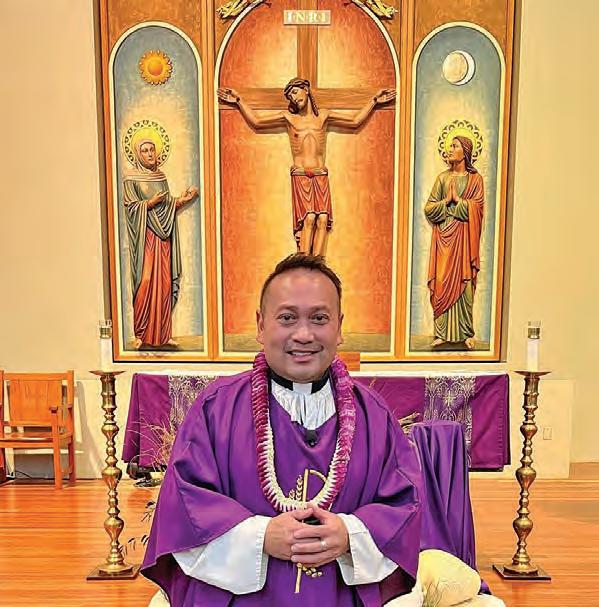
Show,” it is where Fr. Patalinghug dishes out on faith, culture and commentary. He does not shy away from controversial topics but approaches them with a more pastoral perspective.
“I want people to learn about an issue before they just get angry or emotional about it,” he said.
with Fr. Patalinghug and they were a match made in (culinary) heaven!
“He’s a great man, incredibly learned, very talented as a writer and also a tremendously interesting person. He and I worked very well together and even led a pilgrimage together. I consider him a good friend,” Fr. Patalinghug said.
“We collaborated with selecting the saints throughout the calendar year. We then organized some of the talking points as well as the kinds of recipes that we researched. And this book also offers a pastoral takeaway, reminding people how each saint can affect our lives for the better.”
Fr. Patalinghug made sure to include a Filipino saint, San Lorenzo Ruiz de Manila (1594-1637), in the cookbook with a recipe for pancit Canton (noodles) on his Sept. 28 feast day.
He also included St. Damien of Molokai and a recipe for kalua pork on his May 10 feast day. Like in Fr. Patalinghug’s previous works, he provides context and background, “food for
thought” and relevant recipes.
The Father Leo Show Fr. Patalinghug also hosts a cooking show on the EWTN Global Catholic channel called “Savoring Our Faith” which grew from the webisodes in his early years of ministry.
Now in its 13th season, the program describes him as talking about food and faith with Catholics and cooking delicious meals while offering Church teachings in bite-sized portions.
The EWTN website has back episodes that can be watched on-demand and an archive of Fr. Patalinghug’s recipes from around the world, including Filipino favorites like pancit (noodles), chicken adobo, garlic fried rice, pork sinigang, lumpia (egg rolls) and lapulapu (fish).
He also hosted an interview-style podcast, “Shoot the Shiitake”, for four years. But he recently started an eponymous program on YouTube (free) and Patreon (paid membership options). Aptly titled “The Father Leo
“The show has been a labor of love because there are so many competing voices on the Internet. I want to make this show a voice of reason, authentic teaching about the Catholic Church and a practical way to maneuver through life’s difficulties. In a way, this show allows me to just be me, a little unscripted, and allow my personal personality and my passion to discuss these challenging topics,” Fr. Patalinghug said.
Plans For The Future
As he reflects on the past 25 years of his priestly vocation, Fr. Patalinghug entrusts the Holy Spirit to guide his next endeavors in life, as he will continue to bring about a future of stronger families, closer relationships and a deeper understanding of Jesus as Food for our mind, body and soul.
Though only God knows the plans He has for him, Fr. Patalinghug said:
“God willing, in the next 25 years, I will become a holier priest. I still want to remain as active as I possibly can, even if I am slowing down. But I want to be joyful every day, grateful for all the blessings, graceful in carrying the cross and also optimistic and hopeful for the future. Hopefully, we can continue to grow the efforts of our food truck, our new restaurant space in the Baltimore area, grow the audience for all my shows and continue to travel and speak to inspire people and to be fed by God.”
8 HAWAII FILIPINO CHRONICLE JUNE 1, 2024
Fr. Leo Patalinghug was the 2023 parish Lenten mission speaker at St. John the Apostle & Evangelist Catholic Church in Mililani, Hawaii. He said that it was a beautiful experience and powerful mission, with the church filled during each mission night: “It showed that people in Hawaii are hungry for God. And it was also a great opportunity for me to experience the beauty of the land, to taste the amazing food and meet incredible people with a true aloha spirit.”
(Photo credit @SaintJohnMililani)
 By Emil Guillermo
By Emil Guillermo
f you are satisfied with where we are with civil rights in America, then I’m sure you’ll enjoy the next 50 years.
I
If we can manage to stay status quo.
That’s because the next 50 years we’re likely to be in a fight to keep what we have. Or lose it all.
That’s what’s at stake this election year.
So while I was disappointed to not join in on the 50th anniversary gala of AALDEF, the Asian American Legal Defense and Education in New York this week, I already was getting a sense of the next 50 years.
I was in Florida doing my show, “Emil Amok, Lost NPR Host, Wiley Filipino, Vegan Transdad.”
Florida is like Hawaii, the most tropical state on the mainland. But here’s what I found. Filipinos had no clue about the history of racism toward Asians and Filipinos, a general theme in my play.
In “Emil Amok,” I talk about the colonized Filipinos brought to the U.S. to replace the Chinese victimized by the Chinese Exclusion laws.
One of them was my father born under the American flag. As a colonized “American National” my father couldn’t vote, own land, or intermarry. Was he free? Just free to work and take the abuse of xenophobic white males. Filipinos would take their jobs and endure white male rage.
And then when they would dance, date, consort, and even marry white women, often Filipinos were beaten, lynched, or shot dead.
It’s a part of American history few know about. And of course, in a state like Florida, where they have low-information voters, you also have the blowback on so-called “crit-
CANDID PERSPECTIVES
The Last 50 and the Next 50 Years on the Fight for Civil Rights
ical race theory,” creating a population with a low-history mindset.
The Filipinos At The Orlando Fringe
“I’m embarrassed to say I didn’t know a lot of our history,” said Emily Janninck, a Filipino American who recently retired from the medical field. She came to my show and was both entertained and informed.
Janninck was born in the Philippines and was left with her grandmother as an infant as her parents became the first to leave for the U.S. after the historic 1965 Immigration Act lifted the racist quotas that kept a large Asian American community from forming.
Her parents were in Brooklyn and were divorced when Janninck was reunited just with her mom. As a unique 1.5 Filipino generation, she moved with her single mom to Chicago where she grew up and met her husband Jim. For the last 20 years, they’ve been in Orlando.
Clearly, waiting for the arrival of “Emil Amok.”
Another, Asian American in the Fringe audience was Jennifer Chandy, a Filipino Pakistani.
Chandy’s mom, like many of my Filipino relatives in the Philippines, was forced to go to Saudi Arabia to find work.
That’s where her mom met her dad, who came from Pakistan to also find work. Together, they started a family that eventually found its way to the U.S.
And now Chandy is a “Pakipino.”
“There’s not too many of us,” she said. “But we have great food!”
These are the Asian Americans who come to my show. They get the history, but few others understand that the rights of Asian Americans are still threatened like they were 100 years ago.
The Civil Rights Fight The Next 50 Years;
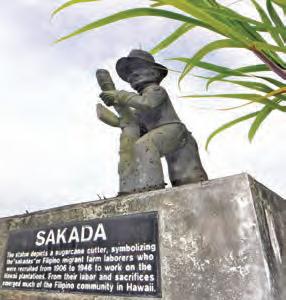
was the most racist immigration act and was in play until the 1965 law ended the zero quotas for Asians.
The exception, of course, was the colonized Filipinos.
But as I’ve said, no aliens, including the colonized were allowed to vote, become citizens, intermarry, or own property.
That last part, owning land or property, is still being fought today.
In Florida, SB264 would ban many Chinese immigrants from buying homes throughout the state. It’s a xenophobic reaction to Chinese people who are seen as possible threats to national security.
It’s the fight from 100 years ago is back.
“Florida’s alien land law specifically targets Chinese individuals in a clear violation of the Equal Protection Clause,” said Bethany Li, legal director of AALDEF.
She hoped that the recent halting of the law would keep copy-cat laws from coming up in other states to ban property sales to more than just Chinese.
“As a country, we should be making progress and passing laws that protect all communities rather than going back in time and reviving antiquated laws.”
Bethany is soon to be the executive director, taking over for Margaret Fung, a co-founder of AALDEF who helped build it to its legendary status as the Asian American civil rights fighter. Fung retires later this year.
What I’m seeing in Florida is an example of the kind of fights Asian Americans will be forced to wage in the coming years.
We climbed the mountain
once. We will be forced to climb the mountain again.
It’s the lesson for the modern Asian American activist.
As we’ve seen in issues like abortion rights and voting rights, the rights game requires perpetual vigilance. Nothing seems settled anymore in America.
There is always someone willing to take away our rights at a moment’s notice.
So while I regretted not being able to see the sunset on the Hudson to celebrate the first 50 years of Asian American civil rights, I was happy to be in Florida where I can see what the battle looks like the next 50 years.
We’ll be fighting the undoing of all major victories. And of course, fighting for gains in areas where no one thought we had any rights at all.
But the last 50 years got us to this point. And for that, we all must be grateful.
First Stop Hawaii
The sakadas were the first to leave the Philippines for Hawaii in the early 1900s, when Hawaii was not a state.
The ones who were born in that era got paradise, but a different experience in the plantations of Hawaii compared to the 30,000 like my dad who
came directly to the mainland in the 1920s.
I learned more about the sakadas when they were celebrated in 2007. One of the sons of that movement was a longtime friend and fellow broadcast journalist Lloyd LaCuesta.
Lloyd and I worked in the San Francisco Bay Area as pioneering Filipino American journalists. He was the first at the local independent KTVU in the 70s.
I was the first at a network affiliate KRON in 1981. Lloyd would later become a San Jose bureau chief for his station. I moved to Washington, where I became the first Filipino to host a national news show, NPR’s “All Things Considered.”
As reporters, we would often see each other at stories and share tales about our fathers. When he talked about Hawaii, I often thought how unlucky my dad was to have skipped paradise. But as we know, it was hard work in the sugar and plantation fields.
This week I was pleased to hear that Lloyd was bestowed an honorary degree from the University of San Francisco to which his current wife’s family are major donors. Congratulations to Lloyd.
EMIL GUILLERMO is a journalist and commentator. His talk show is on www.amok.com.

JUNE 1, 2024 HAWAII FILIPINO CHRONICLE 9
Fighting The Unraveling The 1924 Immigration Act
 By Elpidio R. Estioko
By Elpidio R. Estioko
s Asian American and Pacific Islander (AAPI) Heritage Month was celebrated last May, Ysabel Jurado’s campaign for Los Angeles City Council District 14 (CD-14) received a week-long celebration highlighting endorsements from prominent AAPI community leaders and elected officials.
ADuring AAPI month, her campaign staff announced a series of AAPI Community Leaders and Elected Official Endorsements for her in honor of AAPI Heritage Month, with Jurado being a recognized AAPI community leader.
They acknowledged her presence in the community due to her active involvement in issues affecting her constituents.
Kicking off the commemorative week was the endorsement from the Asian Democrats of Los Angeles County (ADLAC), a steadfast advocate for AAPI representation and empowerment in the political landscape.
The ADLAC’s endorsement reaffirms the growing momentum behind Jurado’s candidacy and underscores the pivotal role of AAPI voices in shaping the future of Los Angeles.
ADLAC’s President Andrew Murphy said:
Quest for 1st Filam Elected Member of LA City Council Gains Momentum
“LA City Council District 14 is home to many historic Asian American neighborhoods, and there is one clear choice who will best represent our Asian communities. Ysabel Jurado is a proven organizer, advocate, and community leader who will lead with integrity and reverse the backroom dealing, corrupt, racially insensitive politics of her opponent. The Asian Democrats of Los Angeles County (ADLAC) wholeheartedly endorse Ysabel Jurado. Ysabel is the right and only choice for Angelenos who care about diversity, community-centered policy, and honest leadership.”
Murphy’s testimony and his group’s endorsement are crucial and very significant in the quest for Jurado to be the first FilAm to be elected to the LA city council.
This is unprecedented, if I may say, for a neophyte politician in the district of LA.
This is not the only one because, in addition to ADLAC, Jurado has been endorsed by a coalition of Democratic clubs, including the Stonewall Democratic Club, the East Area Progressive Democrats, Democrats for Neighborhood Action, and the Pilipino American Los Angeles Democrats, reflecting a groundswell of Democratic support for her vision and the clear choice for the Party.
“I am so excited to receive the endorsement and support of ADLAC. Their


dedication to fostering equitable representation and advocating for justice aligns perfectly with the values driving our campaign,” said Ysabel Jurado.
“As we celebrate AAPI Heritage Month, I feel more compelled than ever to build a truly inclusive democracy, and I’m honored to have ADLAC by my side in this fight.”
A lifelong resident of CD-14, Jurado brings both lived and professional experience to the race.
As an eviction defense attorney, single mother, and daughter of immigrants, she has lived through the challenges faced by many residents in the district.
Her platform centers on advocating for affordable housing, climate justice, workers’ rights, and creating a solidarity economy throughout Los Angeles.
In a crowded field of eight candidates, Jurado earned first place in the primary election, ahead of the incumbent council member who placed second. Recently, she earned the endorsement of the Los Angeles League of Conservation Voters (LALCV).
“The Los Angeles League of Conservation Voters (LALCV) announced its endorsement of Ysabel Jurado in the upcoming November 5 election for Los Angeles City Council District 14 (CD-14),” Jurado said.
“The endorsement comes just days after the campaign announced it had earned the support of progressive powerhouse organizations UAW6, SEIU/ CIR, and the Working Families Party.”
LALCV is known for its vocal support for climate justice candidates in Los Angeles County.
So, they chose to endorse Jurado because of her strong commitment to environmental protection and advocacy, which is one of the main goals of their organization.
In their endorsement, LALCV President Shona Ganguly on the other hand said:
“Ysabel has made environmental protection an important part of her activist career and is exactly the type of candidate that LALCV seeks to support. As an attorney, Ysabel helped several local community land trusts protect open space and facilitated the transfer of private land to native tribes. As an LA City Council member, Ysabel will fight for environmental justice in the district and Citywide. The LALCV Board believes that Ysabel will be a leader on the council when it comes to protecting clean air and clean water and that she can energize her constituents to join her in those efforts.”
Jurado is committed to environmental concerns and sustainable initiatives, so the organization’s endorsement “underscored her commitment to environmental stewardship and her dedication to advancing sustainable initiatives within Los Angeles.”
All the while, they thought she was the right candidate for them… for the organization.
She continues to gather support from individuals
and organizations dedicated to progressive change in Los Angeles.
The long list included Los Angeles District 1 Councilmember Eunisses Hernandez; Los Angeles City Controller Kenneth Mejia; 2022 mayoral candidate Gina Viola; LAUSD School Board member Rocio Rivas; LAUSD Board President Jackie Goldberg; the East Area Progressive Democrats, Culver City Mayor Emeritus Dr. Daniel Wayne Lee; Stonewall Democrats; LPAC; Alliance of Californians for Community Empowerment (ACCE); SEIU/CIR; UAW6; EAA; PALAD; Democratic Socialists of America – LA; and Ground Game LA.
The latter two grassroots organizations helped elect some of the city’s most progressive champions, including Councilmembers Eunisses Hernandez and Hugo Soto-Martinez.
Her campaign staff told me that more endorsements are to come as they are busy making appointments, not only with known professionals but also with small and big organizations in the district.
As I See It, it’s just a matter of time, come the November general election, for Jurado to realize her dream of becoming the first FilAm elected official in the LA City Council.
At the rate the campaign is going, she will surely emerge as the winner.
She is young and talented. She has the guts and the leadership to weather the storm in the campaign trail leading to her hard-earned victory in November.
Go for it, Ysabel!
ELPIDIO R. ESTIOKO was a veteran journalist in the Philippines and a multi-awarded journalist here in the US. For feedbacks, comments… please email the author at estiokoelpidio@gmail.com
10 HAWAII FILIPINO CHRONICLE JUNE 1, 2024 AS I SEE IT
Ysabel Jurado
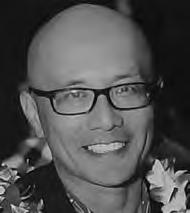 By Will Espero
By Will Espero
he legalization of cannabis for recreational adult use has been a political hot potato for many decades. Opponents and supporters of legalizing cannabis have argued back and forth as government entities lead the way on this controversial matter.
TAlthough cannabis is illegal at the federal level, states in the USA have passed legislation to legalize medical cannabis and adult recreational use.
The federal government has allowed medical and recreational cannabis in states that have taken up the cause with California leading the way for the cannabis renaissance in 1996 with Proposition 215.
To date, 38 states have approved medical cannabis for patients with certain diseases and ailments such as pain relief, PTSD, glaucoma, cancer, AIDS, epilepsy, Crohn’s disease, lupus, and multiple sclerosis.
I know of people who use cannabis for insomnia, anxiety, and stress as well.
Twenty-four states have approved recreational adult use of cannabis with Hawaii falling short this last legislative session.
The Hawaii state Senate did approve a measure, but legislation stalled in the House of Representatives after a few hearings. The House did not have the political will to move a measure to conference, and bills will need to be introduced again for the next biennial.
The cannabis plant has been used throughout the world for thousands of years as it is a plant that grows wild in many regions.
Interestingly, despite the federal government’s lack of support to legalize cannabis, the federal government does own US patent 6630507 which was assigned to the Department of Health and Human Services in 2003.
This patent notes cannabis
All About Cannabis LINGERING THOUGHTS
has medicinal value, and our government clearly understands the potential opportunities in healthcare and patient use. This certainly shows a degree of hypocrisy and misinformation the federal government has been a part of for some time.
Control and profit are two reasons why the federal government took action to be involved in this changing, developing field, and now, the advocacy of many is being heard, albeit slowly and methodically.
The current rescheduling of cannabis by the Biden administration from a Schedule 1 to a Schedule 3 drug is a milestone many advocates have been working on.
When approved as expected, cannabis will no longer be classified as a dangerous drug like heroin and cocaine, but rather as a drug with medicinal value.
It will still be illegal at the federal level, but the barriers to legalization will become less problematic.
The blatant lies by some and the mis-scheduling of cannabis for years as a Schedule 1 drug have hurt our society, and it’s about time facts and evidence-based research are allowed for a very promising wonder plant.
There are many accounts and much evidence of the cannabis plant being a healing plant, and with rescheduling cannabis to category 3, more funding will now go to important research that could lead to a cure for cancer, for example.
RSO (Rick Simpson Oil) is an iconic and well-known cannabis substance with a history of fighting cancer. Its use and lore are legendary in the medical cannabis world.
Marinol is a drug approved by the Food and Drug Administration, and it has synthetic THC, a substance found in the cannabis plant.
Also, epidiolex is another FDA-approved prescription cannabidiol (CBD) to treat seizures associated with certain ailments.
The potential and opportunities are real, and one positive outcome of rescheduling

for humanity will be more scientific medical research by healthcare professionals, institutions, and businesses which will untap the hidden health benefits cannabis holds.
From 1850 to 1936, cannabis and its extracts were a common form of medicine in the United States.
The natural healing plant was used for pain relief, stomach problems, women’s issues, therapeutic matters, and other ailments.
The movement for institutionalized healthcare, corporate greed, and American racism against Mexicans, African Americans, and Asians led to the taxation and eventual banning of cannabis which had once been legal throughout the United States.
The Marijuana Tax Act of 1937 was a culmination of the work to demonize cannabis and to help certain American industries by eliminating the hemp/cannabis industries.
Imagine at one point when Henry Ford wanted to build a car using hemp materials and using a form of hemp fuel to operate the vehicle. If Ford’s vision had become a reality, we might not have the problem with fossil fuels and climate change that we have today.
And if William Hearst had not used his newspapers to spread lies and misinformation about cannabis, more trees and forests may have survived since his stories and articles assisted in the destruction of the hemp industry which competed directly with his forests, trees, and financial investments.
Men of industry and top government officials conspired to ruin and destroy hemp/cannabis, but the tide has now turned after many decades of false narratives.
Hemp by the way has over 10,000 uses including hempcrete to build houses. Imagine a house built primarily of hemp saving more trees and forests.
Whether cannabis will be legal in Hawaii one day remains to be seen. I do believe it is inevitable based on what has been happening around the country.
There are other substances and products - vodka, tequila, cigarettes, sugar, vapes, cigars, beer, and video games - on the market that are far more dangerous than cannabis in my opinion.
If and when cannabis is legalized for adult use, it should be handled the way cigarettes and alcohol are regulated and monitored. Safety and security for our children are paramount.
Adults should not use cannabis or any prescription drugs when driving or working, and cannabis should not be used in public areas. Usage in the privacy of one’s home is the ideal scenario, and if tax revenues can be generated, that’s a big plus.
For many, cannabis use is a matter of choice.
Law enforcement has another perspective, and it is the cannabis laws and policies enacted by white decision-makers that criminalized cannabis and used it to needlessly incarcerate immigrants and people of color.
The consequences and repercussions of these decisions still impact families and com-
munities today in our nation. Fortunes were made and grown by those who helped ban cannabis in the United States, and it’s about time for the attitude about cannabis to change.
Abuse of drugs or substances is wrong, and society must be properly educated and informed about the history, benefits, and potential of cannabis.
I believe cannabis is a wonder plant with healing properties, and the future of cannabis in Hawaii can have economic and financial rewards for Hawaii’s small farmers, homebased industries, and working families.
After President Biden’s rescheduling and declassification of cannabis to a Schedule III drug, the University of Hawaii system should take a serious look at the research and development of cannabis as a global medicine, an economic product, and a revenue source for local families.
Cannabis can be viewed as diversified agriculture. With thousands of empty, fallow acres of land available in Hawaii, cannabis can be an important crop for our state.
WILL ESPERO retired from the Hawaii legislature after serving 19 years in the state House of Representatives and state Senate. He is currently a novelist, poet, and supporter of the arts. Lingering Thoughts provides a glimpse of his perspective on current events and issues.

JUNE 1, 2024 HAWAII FILIPINO CHRONICLE 11
BOOK REVIEW
The Manila We Knew And Street-Bound: Manila On Foot
By Rose Cruz Churma
he Manila We Knew and Care books with different genres but with similar intent—to inspire the reader to re-discover and appreciate the historical and cultural attractions of Manila, as well as its unique shopping destinations and its rare nature-themed habitats.
TAs the school year ends and summer vacation beckons, a lot of families will consider returning to the homeland, with Manila as its first port of entry.
Manila is plagued by calamities— from its crazy traffic, unkempt historical monuments and ugly billboards—such that most leave the metropolis to escape to the provinces. But Manila has its hidden treasures which these two books describe with affection.
The Manila We Knew is an anthology of essays edited by Erlinda Enriquez Panlilio with original art by Manuel D. Baldemor.
This book is a collaborative effort and a product of a
long-running writing workshop led by Dr. Cristina Pantoja Hidalgo, former director of the Creative Writing Institute at the University of the Philippines.
This anthology is primarily a “nostalgia book” since it contains the memories of the writers as they remembered what it was to live in Manila from the 30s to the 70s.
As noted by one of the authors:
“With this retelling, we are passing on to our children and to generations to come our memories—both mental and emotional…This is not merely nostalgia, after all. It is preserving the past and conserving it for future readers and researchers on what Manila was like, once upon a time.”
Street-Bound: Manila on Foot, written by Josefina P. Manahan, is a guide to touring Manila on foot!
At its face value, it seems like an odd book for a country whose people don’t like to do walking tours.
Whether it is due to the lack of sidewalks, or vehicles clogging walkways and side yards, the unbearable heat and humidity, to the lack of


consideration for pedestrians—Manila is not a “walkable” city.
But the only way to appreciate the city—its history and culture—is to visit notable locations on foot.
In this book, “Block by block, the city comes alive, revealing delightful surprises, unexpected treasures” writes Christine Pantoja Hidalgo in the book’s back cover.
The guide categorized the tours into four: nature, historical, cultural and shopping.
There are 22 tours described in this book and are not confined to the original city of Manila but include the outlying areas of the metropolis such as the UP Diliman campus and the shopping mecca of Greenhills to the Ayala Museum in Makati.
One of the tours described is that of the area around San Sebastian Church and the adjoining R. Hidalgo and San Sebastian Streets.
R. Hidalgo was the premier residential area from the 19th century to the early 20th century.
During its heyday, it must have the ambiance of an elegant European residential boulevard, where the street was flanked by stately mansions. The guide describes the architectural features of the buildings.
Unfortunately, there are no photos that accompany the guides—but it does provide the impetus for one to visit the place.
To fully appreciate the
ings were constructed before World War II—the College of Education and College of Law. It would be in 1949 when the campus’s full transfer was implemented.
One pairing that provides the most contrast to what was then, versus the present is the narrative of Laling H. Lim titled “At the Edge of Manila” as she recalls those days in the 1930s when the Malate-Ermita district consisted of elegant homes and lovely gardens, known for its unhurried, gentle lifestyle.
selections in this guidebook, I read it in tandem with some of the selections in the anthology The Manila We Knew
In the narrative “In Search of a Memory” by Josefina Pedrosa Manahan, she writes about R. Hidalgo Street, where her older sister’s piano teacher lived.
One day in January, they were invited to watch the procession of the Señor of Quiapo.
“I looked down on the street and saw the statue of Christ borne on what looked like a huge, black and brown serpent snaking down the street,” she writes of actually seeing masses of men bare to the waist participating in an all-male ritual that had its roots in the Philippines’ ancient past, an animist rite transformed into the cult of the Black Nazarene of Quiapo.
Another narrative is “UP Beloved” by Erlinda Enriquez Panlilio who recalled her first days at the UP Diliman campus soon after graduating from an all-girls Catholic school of Saint Theresa’s College run by Belgian nuns to the “atheistic” state university her father favored (since he was an alumnus).
This recollection can be paired with the last tour guide in the Street Bound book titled “The University of the Philippines.”
Six hundred hectares were set aside for the campus during Manuel Quezon’s term during the Commonwealth period, and two build-
This is paired with the walking tour of A. Mabini Street, which was known as La Calle Real during the Spanish colonial era. The principal street in Ermita-Malate now renamed A. Mabini Street.
A. Mabini Street is currently home to the Hobbit House, a landmark where the waiters are dwarves, and is home to many famous and soon-to-be-famous musicians.
There’s also Tesoro’s, a handicraft emporium, one of many handicraft and art boutiques that line the street. Gone are the mansions and gardens, to be replaced by commercial establishments and “well on its way to becoming a little better than a slum” until a renewal program was initiated by the residents and property owners.
With the anecdotes provided by the authors of The Manila We Knew and the practical descriptions of how to get to these places in the walking tour book, the two books work hand-in-hand—a must for those revisiting Metro-Manila who are curious, adventurous, and healthy— willing to discover unexpected surprises that linger and new memories to treasure.
ROSE CRUZ CHURMA established Kalamansi Books & Things three decades ago. It has evolved from a mail-order bookstore into an online advocacy with the intent of helping global Pinoys discover their heritage by promoting books of value from the Philippines and those written by Filipinos in the Diaspora. We can be reached at kalamansibooks@gmail.com.
12 HAWAII FILIPINO CHRONICLE JUNE 1, 2024
Always Developing, Never Developed
By Seneca Moraleda-Puguan
efore we sleep, my husband and I usually spend time together watching an episode of a Korean drama. But last night was different.
BWe slept late because we watched a different kind of drama: a telenovela in the Philippine Senate that involved the Mayor of Bamban, Tarlac, Alice Leal Guo.
She is suspected to be a Chinese spy or an asset and is allegedly linked to illegal Philippine Offshore Gaming Operator (POGO) companies in her town.
Senators, led by Senator Riza Hontiveros, are scrambling to know the truth about her nationality and involvement with Chinese companies.
I am not here to give
my thoughts about this fiasco since the investigation is still ongoing. It’s such a complex case that it will take a lot of time to flesh out the truth and the Senate has to do well in doing so.
Unfortunately, I noticed that some of them are wasting precious time asking the wrong questions. As this case has intrigued me a lot, given the tension between China and the Philippines because of the territorial disputes in the South China Sea, I will be carefully looking at this issue, hoping for truth to be revealed and for justice to prevail.
During our discussion, my husband and I couldn’t help but feel brokenhearted for the Philippines, our beloved country.
In the course of our lives, we have witnessed several Senate hearings involving

leaders in high positions accused of graft and corruption, money laundering, and so many unrighteous acts that betray the people who have put their trust in them.
The Philippines, though rich in resources and manpower, tends to be bullied and taken advantage of by stronger countries because its leaders can easily be swayed and its people, effortlessly manipulated.
Endemic corruption sprawls across different
SPORTS CORNER
parts of the society, causing those in authority to gain more power and the poor to further suffer.
Given the current situation in the Philippines, and not seeing improvements in many aspects of life, it’s such a disappointing revelation and conclusion to us, that the country we dearly love, remains to be always developing and never developed.
Ever since we were young, the country has been known as a developing country. More than three decades later, nothing has changed. Are we content to hold the title of just “developing”?
I pray that the next generations will witness change and experience progress. I pray that in my children’s and their children’s time, they can boast that the Philippine archipelago truly develops and shines as the Pearl of the Orient Seas.
Last night, before we slept, we were moved to pray for our home country. We are privileged to be living in a First World Country where we get to experience world-class transportation, a high standard of living, and excellent benefits for families.
But our many “kababayans” who are suffering and believing for better governance and improved way of life, are always in our thoughts and prayers.
Though we are thousands of miles away from our homeland, we believe that we were created to be Filipinos for a reason. We will never stop losing hope for the country of our birth and we will keep believing that change is still possible. Oh Philippines, may healing be upon you. May righteousness and justice be your foundation. May you be victorious against your enemies. Arise!
Lee Kiefer: A Filipina American Trailblazer on the Road to Olympic Glory
By Dylan Bothamley, MD
ee Kiefer’s name has become synonymous wi th American fencing and with good reason. The Filipina American has had an astounding career and will look to defend her Olympic title at the Paris 2024 Olympics.
LBorn in Cleveland, Ohio, to a Filipina mother Teresa, and an American father Steve, her family played a key role in her rise to the top of the fencing world.
Kiefer’s fencing journey began at a young age, inspired by her father, a neurosurgeon who had captained the Duke University fencing team while in college.
Kiefer’s father once joked that his daughter’s passion for fencing may have come from watching him lose a local fencing tournament.
Steve told NBC News, “Toward the end of the tournament, a 14-year-old girl just took me apart, and I think that stood out in the minds of my daughters like, ‘Hey, I’d like a piece of that action.’”
Kiefer’s mother, Teresa, was born in the Philippines moving to the United States at a young age. She studied to become a psychiatrist and instilled in her daughter the importance of discipline and perseverance, traits that would prove invaluable in Lee’s athletic career.
Kiefer’s older sister, Alex, is also an ac-

complished fencer, having achieved All-American selection and won the 2011 NCAA championship in foil fencing while attending Harvard University.
Lee and Alex even faced off in the NCAA Championships in Lee’s freshman year at Notre Dame. Alex came out victorious in that matchup but the younger Kiefer would go on to accomplish feats in fencing that are noth-
ing short of remarkable.
Lee would become a four-time NCAA champion and a ten-time team Pan American champion, and in 2017 at age 22 she became the first U.S. Women’s Foil Fencer to earn the number one World Ranking.
Kiefer’s crowning achievement came at the 2020 Tokyo Olympics, where she became the first American foil fencer in history to win an individual gold medal, or an individual medal of any kind for that matter. The highlights of the riveting match can be viewed on YouTube: https://www. youtube.com/watch?v=AN4lOKAr1y4.
Beyond her athletic achievements, Kiefer is also a dedicated student and an aspiring doctor. She graduated from the University of Notre Dame with a pre-med degree and is currently pur-
suing a medical degree at the University of Kentucky.
Kiefer’s commitment to both her athletic and academic pursuits is a testament to her drive and determination.
Kiefer is setting her sights on becoming one of the all-time greats in the sport of fencing and will be a must-watch as she competes for the United States once again in the 2024 Paris Olympics.
Her success has not only made her a household name in American fencing but has also made her a source of pride for the Filipino American community.
As Lee Kiefer continues to break barriers in the world of fencing, she also serves as an inspiration to young athletes across the globe and is the embodiment of a well-rounded human being.
JUNE 1, 2024 HAWAII FILIPINO CHRONICLE 13 PERSONAL REFLECTIONS
Lee Kiefer
Mayor Alice Leal Guo
HAWAII WORKERS CORNER
 By Dr. Arcelita Imasa
By Dr. Arcelita Imasa
he 2024 Hawaiʻi Legislative Session has concluded. How did our Hawaii legislators do in supporting Hawaii workers like me?
T– Reader
Dear Reader,
Thank you for your question! However, it is with a sad heart to share with you that many community groups including the Hawaii Workers Center were disappointed in seeing the bills that we all worked for and wanted to get passed by our legislators get tabled for another session.
Did our elected officials prioritize workers this year? The quick answer is NO Let’s review.
Paid Sick Leave and Family/ Medical Leave
Thousands of Hawaiʻi’s workers have no access to paid sick leave or paid family leave. Multiple bills introduced this session would have required employers to provide a minimum amount
The 2024 Hawaii Legislative Session: Hawaii Workers Edition
of paid sick leave/ paid family leave.
Did our legislators pass this? NO.
End the Subminimum Wage
Tipped workers in Hawaiʻi can legally have $1.25 removed from their hourly pay if tips make up for it. For a full-time tipped worker that is over $2,600 taken from their pay; why are we punishing workers for their good service? This bill would have banned the tip rip-off for tipped employees.
Did our legislators pass this? NO.
Rental Repairs
Some of our COFA Workers Association of Honolulu tenants recently took their landlord to court for inadequate living conditions, this bill would provide additional protections for tenants in this situation by amending the deadlines related to the repair of conditions that constitute health or safety violations and the payment of past due rent.
Did our legislators pass this? YES!
This is a win for ensuring safe and dignified housing in Hawaiʻi! Mahalo to all who answered our calls to action and submitted testimony.
Keiki Credit
Hawaiʻi families struggle with exorbitant and constantly rising costs of living. The Keiki Credit, a refundable tax credit, would have delivered much-needed relief to working families with children.
Did our legislators pass this? NO
Housing: Short-term rentals
In the aftermath of the Maui fires, the existing housing crisis has gotten even worse. This bill would give counties the full authority to regulate short-term transient vacation rentals. With this bill, short-term rentals can now be converted to longterm housing for the working people of Maui.
Did our legislators pass this? YES!
Mahalo to Lāhainā Strong and Our Hawaiʻi for their community organizing to ensure this bill got passed.
Ceasefire in Gaza Resolution
Relentless violence against the Palestinian people has been escalating since October.
The resolution calls upon the Biden Administration and Hawaiʻi’s Congressional delegation to publicly
HEALTHLINE
demand an immediate and permanent ceasefire in Gaza, the release of all hostages, the facilitation of humanitarian aid into Gaza, and to continue negotiations for peace in the region.
Did our legislators pass this? YES!
Hawaiʻi officially became the first “state” to pass a ceasefire resolution! Mahalo to every single one of you who has stood on the right side of history and humanity in calling for a ceasefire and an end to the occupation in Palestine.
Rental Application Fees
Currently, there is no cap on rental application fees meaning that landlords can charge fees for each adult applicant in the household. Landlords on Maui have even been using this loophole as a way to profit amid the increased housing shortage following the fires.
This bill would have prohibited a landlord from charging application fees for a background check or credit reports if you can provide them on your own.
Did our legislators pass this? NO
Despite these disappointments, we expect to come back next session even
stronger as we continue to organize and push for paid family and medical leave, ending the tip penalty, and a tax system that is truly fair and equitable.
We want to thank the champions in the legislature who continue to believe that priorities for the least of us will ultimately benefit all of us.
We are still grateful that some positive change was enacted this legislative session, including the ceasefire resolution and bills to combat the housing crisis.
However, as you can see, many of our bills that would have provided crucial relief to Hawaiʻi’s workers were killed by our legislators.
We call upon them to do better for working people in the coming year—it’s their job.
But we must collectively stand up against the continued mistreatment of workers, from wage theft to exploitation, there is much we can do to advance working-class interests.
Sincerely, Hawaii Workers Center
Dr. ARCELITA IMASA is a practicing family physician and the secretary of the Hawaii Workers Center’s Executive Committee of the Board. She grew up in the Philippines before migrating to Hawaii with her family more than a decade ago.
Helpful Tips for Maintaining Strong Vision
By Janet Kelley
Approximately 37 million adults in America have age-related macular degeneration, cataracts, diabetic retinopathy, or glaucoma, all of which can cause visual impairment or blindness.
“Many people think eye care is something you only need to worry about when you get older,” shared Dr. Steven Rhee, Medical Director, and head Ophthalmologist at Hawaiian Eye Center.
“But in reality, there are a number of vision conditions that can affect people in all stages of life. Taking care of our eyes should always be a priority, like eating healthily and exercising.” The easiest way to maintain healthy vision is to receive regular comprehensive eye exams.
In order to thoroughly examine a patient’s vision, an eye care professional will use drops to dilate and widen the pupils to check for common

vision problems and eye diseases.
It is the best way to find out if you need glasses or con-
tacts or are in the early stages of any eye-related diseases. Along with comprehensive eye exams, here are eight
simple ways you can stay on top of your vision health:
1. Learn your family’s eye health history. It is important to know if anyone has been diagnosed with an eye disease or condition since some are hereditary.
2. Eat right to protect your sight: In particular, eat plenty of dark leafy greens such as spinach, kale, or collard greens, and fish that is high in omega-3 fatty acids.
14 HAWAII FILIPINO CHRONICLE JUNE 1, 2024
LET’S ZUMBA | Filipino Community Center | Every Monday starting January 8, 2024 at 6:15pm | FilCom Center, Consuelo Courtyard, 94-428 Mokuola Street, Waipahu | Need to unwind in movement and dance after a long workday? Join the community as we Zumba through the evening. Only $5 per class. Proceeds go to support these program-types for FilCom Center.
13TH ANNUAL FESTIVAL OF PACIFIC ARTS & CULTURE | The Pacific Community – SPC, Gravitas Pasifika | June 6-16, 10am-4pm | Hawaiʻi Convention Center, 1801 Kalākaua Ave,
COMMUNITY CALENDAR
Honolulu | The festival is the world’s largest celebration of indigenous Pacific Islanders. For more information, visit https://www.festpachawaii.org/.
31ST ANNUAL PISTAHAN PARADE AND FESTIVAL | The Pacific Community – SPC, Gravitas Pasifika | August 10-11, 2024 | Yerba Buena Gardens, San Francisco, California | The Filipino American Arts Exposition (FAAE) of the rich tapestry of cultures and ethnic communities of the San Francisco Bay Area through its promotion of Filipino American art, music, film, dance, cuisine, history, and more.
FAAE celebrates its ancestral heritage and contemporary traditions, broadening awareness and understanding of Filipino history and culture. For more information on the festival, visit www.pistahan.net.
107TH KING KAMEHAMEHA CELEBRATION PARADE | King Kamehameha Celebration | June 8, 2024 from 9am -5pm | From Richards Street and King Street to Kapiolani Park | Join the parade and celebrate King Kamehameha. The parade will head towards Kapiolani Park where there will be live entertainment, hula, food booths and more showcasing Hawaiian culture.
Reflection of a Dad on Father’s Day
By Bermie Dizon
Ihave four kids, and they’re all grown up, having their own families and good jobs. My wife and I feel blessed to have such awesome kids.
As their dad, people often ask me what we did to raise them right. It’s a big question because lots of families struggle with parenting. There’s so much stuff out there fighting for their attention and wasting their time. Things like video games, social media apps like Facebook, Instagram, and TikTok, and texting with friends.
Just look around at the mall, a restaurant, or even a park, and you’ll see people of all ages glued to their phones.
Looking back, there are important lessons I learned as a dad. For me, the most important thing is understanding that being a dad is a sacred job.
It’s something God called us to do. That’s why I believe every day should be Father’s Day, especially since God is our true and everlasting Father.
Fatherly love is like the love from our Heavenly Father – it’s unconditional.
Just as God loves us, dads are supposed to love their kids with all their hearts. Here are some important things dads should do:
Be there for your kids: True love isn’t about the stuff you buy. It’s about spending time with your
kids. Dads, make sure you’re there for your kids. Talk with them, do things together, and make memories. Being there shows how much you care.
“These commandments that I give you today are to be on your hearts. Impress them on your children. Talk about them when you sit at home and when you walk along the road, when you lie down and when you get up.”
(Deuteronomy 6:6-7)
Help your kids grow: Dads should help their kids become their best. Create a safe and supportive space for your kids to thrive. Give them loving advice, encourage them, and help them through tough times. Your support helps them be strong and confident.
“Train up a child in the way he should go; even when he is old he will not depart from it” (Proverbs 22:6)
Lead by example: Dads, you’re not just providers –you’re leaders too. Show your kids what it means to be kind, honest, and faithful. Your actions are powerful and teach your kids how to be good people.
“The righteous man walks in his integrity; His children are blessed after him” (Proverbs 20:7)
It’s okay to be real: Being strong isn’t about hiding your feelings. It’s okay to show when you’re sad, apologize when you mess up, and try to make things right. Being honest builds trust with your kids and makes your bond stronger.
Keep talking to God:
When things get tough, talk to God. There have been many situations as our kids were growing to be teens that challenged us. Sometimes I don’t know what to say or what to do. That is when I go to our true Father. It is the time to ask for help and wisdom. Pray for your kids too, that they grow up to be good people. Remember God is only a prayer away.
“Do not be anxious about anything, but in every situation, by prayer and petition, with thanksgiving, present your requests to God. And the peace of God, which transcends all understanding, will guard your hearts and your minds in Christ Jesus.”(Philippians 4:6-7)
And one more thing…
Some people haven’t had good dads. When Father’s Day comes around, they might feel sad because they never had a dad to look up to. But I want you to know that
(HEALTHLINE: Helpful....from page 14)
3. Maintain a healthy weight.
4. Wear protective eyewear when playing sports or doing activities around the home, such as painting, yard work, and home repairs.
5. Quit smoking or never start.
6. Wear sunglasses that block 99 percent-100 percent of ultraviolet A (UVA) and ultraviolet B (UVB) radiation.
7. Wash your hands before taking out your contacts and cleanse your contact lenses properly to avoid infection.

your worth isn’t defined by not having a positive dad in your life.
You’re not alone. Lots of people have been through the same thing, wishing for a dad’s love and guidance. Not having a good dad doesn’t mean you can’t love, succeed, or be happy.
You can break the cycle, change your story, and create your own path filled with love and kindness.
Find positive role models and mentors who can support you like a dad
8. Practice workplace eye safety.
Taking care of your eyes will also benefit your overall health. People with vision problems are more likely than those with good vision to have diabetes, poor hearing, heart problems, high blood pressure, lower back pain and strokes, as well as have increased risk for falls, injury and depression.
In addition to your comprehensive dilated eye exams, visit an eye care professional if you have:
• Decreased vision.
would. Surround yourself with people who believe in you and remind you of how valuable you are.
And most importantly, remember that you’re loved unconditionally by a Heavenly Father who knows and cherishes you endlessly. His love fills the gaps left by earthly dads. Find strength and joy in His love, knowing you’re always in His care.
BERMIE DIZON is a retired pastor of Grace Communion International at Glendora, California and a former writer for USA Tribune for 9 years.
• Eye pain.
• Drainage or redness of the eye.
• Double vision.
• Diabetes.
• Floaters (tiny specks that appear to float before your eyes).
• Circles (halos) around light sources; or
• If you see flashes of light.
For this Healthy Vision Month, take care of your eyes to make them last a lifetime. To learn more about eye health, visit: www.hawaiianeye.com.
JUNE 1, 2024 HAWAII FILIPINO CHRONICLE 15
BIBLE REFLECTIONS
L-R Ben, Bermie, wife Millet, Carmel, David and Abel



JUNE 1, 2024














 By Atty. Emmanuel S. Tipon
By Atty. Emmanuel S. Tipon


 By Emil Guillermo
By Emil Guillermo


 By Elpidio R. Estioko
By Elpidio R. Estioko


 By Will Espero
By Will Espero






 By Dr. Arcelita Imasa
By Dr. Arcelita Imasa



